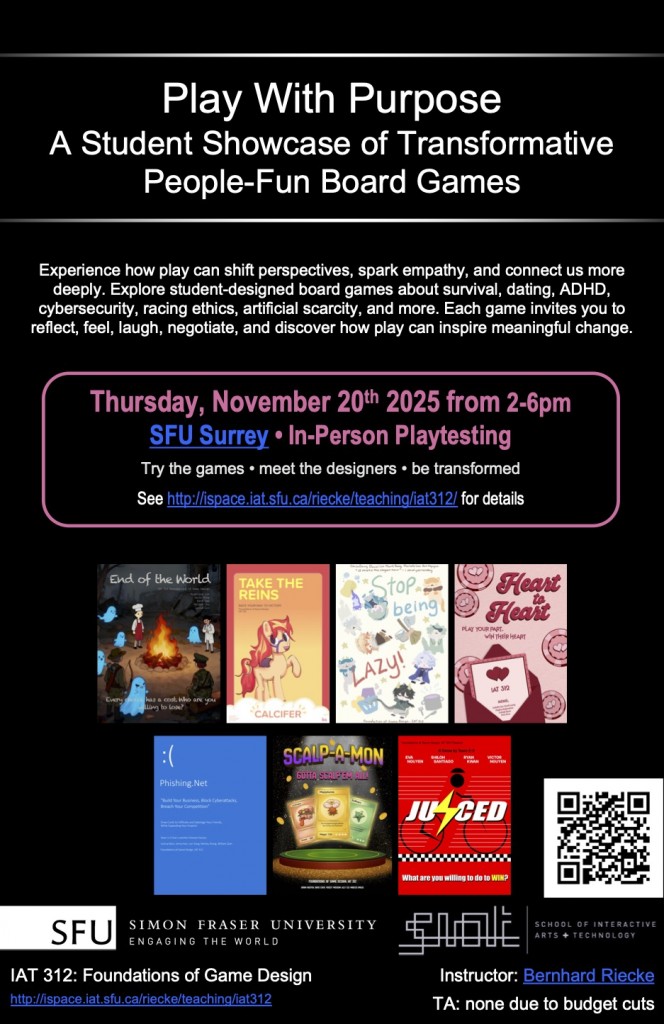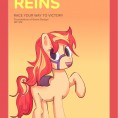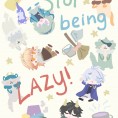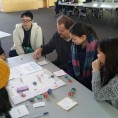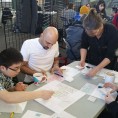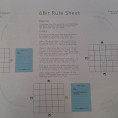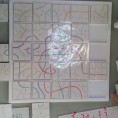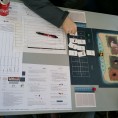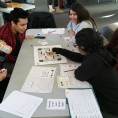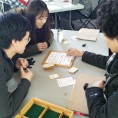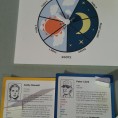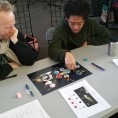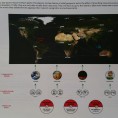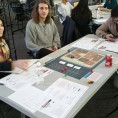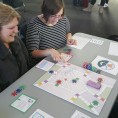Current offering: Fall 2025, taught by Bernhard Riecke
[next offered in Spring 2026]
Join us for our Game Design Showcase on Thursday 20 November 2025
On Thursday 20 November, students from my Foundations of Game Design course (IAT 312) will showcase their final game design projects where they were tasked to design a (digital) boardgame that is not only fun to play (addresssing what Lazzaro calls “People Fun”), but also “transformative” or “purposeful” (aka “Transformative Fun”, what Lazzaro refers to as fostering altered states): That is, apart from being fun to play, the game should also be meaningful/purposeful or add value by somehow changing the player’s out-of-game behaviours or perspectives. During the course, students reflected on topics that they care deeply about that could help create a better world, and designed a game to tackle that topic.
How to participate? Join us for in-person game demo/playtesting at SFU’s Surrey Campus in the Mezzanine, from 2 - 6pm
If you’d like to try out any of the games and/or chat with the game designers or instructional team, join us from 2-6pm on the SFU Surrey campus, in the Mezzanine (up the escalator/stairs one flight), see directions.
Discover how board games can change how we think, feel, and connect.
This showcase features student-designed Transformative People-Fun games—social, emotional, and reflection-driven experiences tackling topics such as:
- surviving moral dilemmas and scarce resources
- navigating dating, trust, and connection
- understanding ADHD through lived-experience mechanics
- confronting cybersecurity frustrations
- exploring ethical temptation, risk, and corruption
- laughing (and cringing) at the world of scalping and artificial scarcity
- bonding with a horse you raised yourself as you race toward victory
Play, chat with the designers, and see how meaning and fun intersect at the table.
Documentation of prior course offerings and showcases from
Project posters
Details about the Final Transformative People Fun Games
Final showcase
Play our Fall 2025 games on Table Top Simulator
Want to try out Games from prior classes?
type “IAT312” into the search field on the Tabletop Simulator site on Steam or through this direct link.
End of the World
Every choice has a cost. Who are you willing to lose?
Razor: Survive the week by exploring areas to find resources and flipping event cards to decide the fate of your team.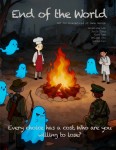
“End of the World” is a tense, cooperative survival board game where players must manage scarce resources and explore different areas each day to stay alive. Unpredictable events force players to adapt, collaborate and sometimes make difficult choices about who survives. Strategic planning, quick thinking, and teamwork are essential to surviving the seven-day trial and maximizing the number of survivors because every decision impacts the later stages of the game. The game combines resource management, social interaction and unexpected challenges to create an engaging experience.
team 1–1 short game pitch video:
Final project video:
Take the Reins
Train your horse and race your way to victory!
Razor: Is a competitive chance game, is not a friendly predictable experience.
Train your new horse friend and feel the excitement of horse racing in Take the Reins, a board game where you’ll raise and race your horse against your peers! Roll your dice to assign stats to your horse, they’ll make the differences for gameplay decisions. Make your way around the board, but beware game changing event spaces, or abilities cast by players, they are the key to victory!
team 1–2 short game pitch video:
Final project video:
Stop Being lazy!
ill make the slogan tmrw
Razor: A lighthearted but emotionally grounded board game that transforms everyday distractions into empathy for the ADHD experience.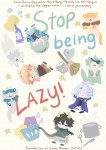
In Stop Being Lazy!, players race to complete mundane chores while facing constant distractions, fatigue, and fleeting motivation. Every turn you have a plan — but notification, naps, and other distractions drag you away before you can finish. You will need to manage your limited actions points, rely on boosts like ‘Locking-In’, and help each other push through burnout. At first, it will feel
team 1–3 short game pitch video:
Final project video:
Heart to Heart
Play your Part, Win their Heart
Razor: This game is meant to simulate dating and building connections but isn’t social deduction.
Heart to heart is a connections-focused game in which 4–8 players attempt to get to know each other, build connections, match with other contestants and win the game! Players embody a character using traits and profiles and answer questions as their character, and give ‘love tokens’ to their desired matches. Win the game by receiving the most love tokens from others.
team 1–4 short game pitch video:
Final project video:
Phishing. Net
Build Your Business, Block Cyberattacks, Breach Your Competition
Razor: Draw Cards to Infiltrate and Sabotage Your Friends, While Expanding Your Empire!
Phishing. Net is a transformative people-fun game meant to communicate the frustration of user-facing cybersecurity, defence. Each player takes on the role of a cybersecurity expert trying to prevent the user from compromising the infrastructure around them, all while trying to exploit the enemy user’s self-sabotage. The goal of the game is to survive the grand cybersecurity threat landscape despite the user’s self-sabotage
team 1–5 short game pitch video:
Final project video:
Scalp-a-mon
Gotta Scalp’em all!
Razor: If it doesn’t make players feel the thrill and guilt of profiting from worthless pieces of paper, it doesn’t belong in Scalp-a-mon.
Scalp-a-mon! is a chaotic, satirical trading game where players embody greedy collectors and cunning scalpers competing to build the ultimate monster collection. Each round, players gamble on market shifts, negotiate, or flat-out scam their friends to turn hype into profit. Limited drops, fluctuating prices, and face-down trades recreate the frenzy of real-world scalping, complete with its thrill, deception, and fallout. As laughter and betrayal spiral, players begin to feel both the rush of exploitation and the sting of being exploited. Scalp-a-mon! invites players to reflect on the absurdity of artificial scarcity and what it really means to “be the very best.”
team 2–2 short game pitch video:
Final project video:
JUICED
What are you willing to do to win in this competitive push-your-luck social game about professional cycling?
Razor: Juiced is a competitive social push-your-luck game, not an easy-fun roll to move game.
Juiced is a competitive social game, where players will face the temptation of whether or not to “juice” to gain an edge in the competition. Each match is full of drama, suspicion, and sacrifice. In the end, players will discover whether winning through unfair means is worth the consequences.
team 2–3 short game pitch video:
Final project video:
Midterm People Fun games
by week 6 students had already designed and playtested the below “People Fun” gamesfrom scratch — enjoy!
Yes, Chef!
Trust your gut — every dish could be a lie.
Razor: It's like Cheat where you make your deck of cards and announce to every player what cards are discarded with the cards faced down, and Poker where players make bets, but on whether or not the other player is lying.
“Yes, Chef!” is a bluffing and betting game where players take on the role of chefs trying to complete their dishes whether real or fake. Each round, players secretly build a recipe from ingredient cards and present their dish with confidence. Other players must decide whether to trust the chef or call their bluff by betting their coins. Strategy, luck, and poker faces intertwine as lies are revealed and fortunes are won or lost.
team 1–1 short game pitch video:
Googly Guns
Gamble to destroy your friends and family.
Razor: Is a plotting mischief game; is not a friendly predictable experience.
Googly guns is a fun game of chance in which players gamble their lives to shoot their friends and be the last person standing. Each player is given the choice to shoot themselves if they believe the bullet is a blank, or shoot an opponent if they believe it to be live. They can also play action cards to power themselves up or disrupt foes.
team 1–2 “Gambling Goons” short game pitch video:
Crowns & Daggers
Bluff big. Roll High. Rule the kingdom
Razor: A fast-paced, social-deduction game where bluffing and a little bit of luck decides whether the King's Court, the Cult, or the lone Chaos claimant prevails.
Crowns & Daggers is a social deduction party game where players bluff, bargain, and gamble their luck with cards and dice as the steering wheel.
Each game pits the loyal King’s Court, the plotting Cult, and a single unpredictable Chaos claimant against each other.
team 1–3 “Mark’s Rift” short game pitch video:
Summit
Reach the summit to be the G.O.A.T! (Greatest of All Time) Survive on your own or risk helping or sabotaging others!
Razor: Our game is a turn-based race where goats climb up the mountain while deciding to betray or help others. It is not a slow game with a predictable outcome.
Summit is a quick-paced card progression game in which 4–6 players compete to reach the top of the summit first. In Summit, each player takes on the role of a mountain goat competing to be the first to reach the summit. Players use their special abilities and their hand of cards to climb upwards, help allies or knock back rivals down the mountain. Every turn, players get the choice between advancing their own climb or sabotaging someone else’s. Each goat must choose their moves wisely, as they never know if they will be hit with a betrayal, as only the sharpest goat will claim the summit.
team 1–4 “SCAIM” short game pitch video:
Greedy Goblins
Get rich get out
Razor: A turn-based card swapping game, where each player fights for the lottery card and tries to convince others to vote for them
Greedy Goblins is a game about deception, card swapping, and social deduction. Convince others that you have the shareable treasure, so that you can be voted as winner when you actually have the individual treasure. Everytime you are voted with the individual treasure you gain gold coins. If you are voted with the shareable treasure, you and everyone who voted for you gets gold coins.
team 1–5 “Cha Li and the Chinese factory” short game pitch video:
The Vault
Your ally today, your executioner tomorrow
Razor: A semi-cooperative game where you must work together to survive, but compete to win
The vault is a tense, asymmetric card game of survival and social intrigue set in a post-apocalyptic bunker. One player is the Overseer, tasked with managing scarce resources and completing critical tasks to ensure the vault’s survival. The other players are Dwellers, who must contribute to these tasks while also protecting their own hides. The core experience revolves around a fragile alliance; Dwellers must work with the Overseer to survive, but can also secretly plot rebellion, steal from each other, or make selfish deals. This creates a dynamic where every decision to cooperate or betray is a meaningful gamble.
team 2–2 “Vault 22” short game pitch video:
Indefensible
The embarrassing improv game of bad takes and even worse reasoning.
Razor: Is an improvised table-talk party game; is not formal debate.
In Indefensible, players must use their quick wits and hilarious logic to transform absurd prompts given by their friends into a brilliant, ridiculous, defense. It’s not about being right, it’s about being the most memorably wrong. Over the course of the game, players will feel a deeper connection through laughter, awkward moments, and the insane prompts you will hear out.
team 2–3 “Team Woke” short game pitch video:
Want to try out Games from prior classes?
type “IAT312” into the search field on the Tabletop Simulator site on Steam or through this direct link.
Course outline
Brief course intro video (spring 2021)
Course description
Welcome to IAT 312. This year, IAT 312 transforms into a vibrant, collaborative agile indie game studio.
In this course, you’ll experience what it’s like to work as part of a real-world professional game studio, designing deeply meaningful, socially enjoyable, and transformative “People Fun” games that engage players at a deeper level. You’ll move beyond simply creating entertaining experiences to crafting games that foster meaningful social connections, thoughtful engagement, and purposeful interactions among players.
There’s no TA this semester, placing creative leadership directly into your hands. Through iterative agile sprints, you’ll rapidly prototype and test your ideas in teams, learning how to effectively manage your projects like professionals. You’ll regularly give and receive constructive peer feedback, refining your designs to achieve meaningful player experiences.
Instead of overly relying only on traditional numeric grades, this course embraces a reflective, coaching-oriented approach to assessment. You’ll regularly reflect on your design process, team collaboration, personal growth, and creative insights, supported through coaching-style dialogues and narrative self-assessments. The goal is genuine growth—not numeric grading stress, although we might need to do regular micro-quizzes given that there won’t be any TA.
You’ll develop skills highly valued by professionals: agile project management, effective communication, reflective practice, collaborative teamwork, and critical thinking—including thoughtful use of AI tools as collaborative thought partners.
By the end of the semester, you’ll have created not only innovative game projects but also professional-quality portfolios showcasing your growth as designers, collaborators, and reflective learners. Together, we’ll foster a joyful, supportive studio culture that transforms challenges into authentic opportunities for growth, meaningful creativity, and playful exploration.
No programming or Unity/Unreal knowledge is required. All games created in this course will be or mimick analog/board games (using Tabletop Simulator).
Let’s have fun, learn deeply, and create purposeful games that players genuinely love to experience together!
Intended learning outcomes
The course is intended to support you to gain both practical experience with and a critical understanding of the foundations of game design in specific contexts. Specifically, by fulfilling the requirements of the course you will be prepared to accomplish key tasks in 4 main game design areas:
- Game Design Basics:
- Explain and critically reflect on games, and the characteristics and features of different types of games including their components, mechanics & rules, dynamics, and aesthetics/UX/fun, the “Magic Circle”, and what makes for a compelling game
- Analyze and argue what makes for a compelling game (or not) and why people like to play games
- Game Design Frameworks & Psychology
- Compare and contrast different frameworks and underlying assumptions, and determine how and when to use which frameworks
- Explain different player types and psychologies, how they affect their gameplay, assumptions, and preferences, and use this knowledge to improve game designs
- Game Design Process:
- Explain and effectively utilize game design best practices/processes/frameworks/mechanics, and explain how you did this when designing several games in teams. This includes typical game design phases such as ideation, prototyping and play testing as the base for an iterative game design cycle
- Analyze, discuss, and critique games using appropriate terminology, and provide well-structured, constructive, and useful feedback (e.g., after playtesting or game pitches).
- Discuss the difference between game critiques vs. playtesting, and demonstrate why, when, and how to use either of them effectively to improve your game and design process
- Effectively demonstrate and reflect on how to effectively communicate your game across different stages (from early prototype to final game), to different audiences (both internal and external), and using different presentation formats (incl. written instructions/rule sheets, pitches, game design documents (GDDs), and game videos)
- Game Design Teams:
- Reflect on and apply suitable processes and team-based, collaborative practices used in game design including ideation, prototyping, iterative revisions, and playtesting as the base for an iterative design cycle to a game design project.
- Specific processes covered in this class may include structured team brainstorming (affinity diagramming), moodboards, inspiration analysis, Razor & Slogan, Play Matrix, playtesting scripts, structured game critique/analysis, and Agile project management)
- Explain what makes a good game designer, and why and how they often work in teams
- Reflect on your own and others’ assumptions, lenses, beliefs, what people really care about, and preferences about games/playing, and how do they affect game design and teamwork
- Explain and utilize a toolbox of how to foster a collaborative, constructive, and supportive team culture and process, including patterns of thinking and behaviour that support effective teams, as well as specific tools, tips, processes and frameworks (incl. Agile) that might be useful
- Find ways to effectively address challenges that can occur in team-based environments while being respectful and constructive. (This could include collaboratively resolving challenges that commonly occur in team-based projects, such as balancing between leading/following, communication challenges, conflicts that arise, ensuring all team members contribute meaningfully, engaging all team members, ensuring all care for the project and each other, getting people on the same page, and figuring out a shared vision/purpose that all can care about).
- Reflect on and apply suitable processes and team-based, collaborative practices used in game design including ideation, prototyping, iterative revisions, and playtesting as the base for an iterative design cycle to a game design project.
Course-level educational goals
The course should help you gain practical experience with and a critical understanding of:
- The existing attempts to analyze the psychology of players and how it affects game design and consumption
- The process of game design and its components such as prototyping and play testing
- Some of the dimensions along which to think about game design and critique existing designs, such as art style, narrative and game balance
- A subset of the mechanisms available to accomplish game design goals, such as reward systems and economic systems
Delivery Method
This course will include a weekly live lecture (2 hours) and a workshop-tutorial aka collaborative agile indie game studio (4 hours) component. The course will be delivered via in-person instruction (if all goes well). Students are expected to participate in:
- synchronous activities during the scheduled course times. This includes a live, interactive lecture with demonstrations, discussions and student group presentation/discussion on assigned topics. In the workshop-tutorial, students will practice and apply the concepts of the lecture in playing, critiquing and designing several games
- asynchronous activities (e.g., independent preparation before the lecture, teamwork, peer work etc. to prepare each week and to pace yourself carefully in order to stay on top of the activities/assignments and to get the most from the class).
The learning environment will be active, supporting, and will afford opportunities for students to strengthen knowledge, skills, and feel a part of a community.
you can find more information and examples/videos of prior course projects at the course website http://ispace.iat.sfu.ca/riecke/teaching/iat312/
Teaching/Learning Activities
these include:
- Interactive lecturing and demonstrations
- Flipped-classroom activities: e.g., students are asked to watch online tutorials & do readings at home so they can come to class prepared to do a short quiz, discuss and apply the material, and fill out the weekly JiTT online assignments
- Tutorial sessions
- A team project made up of several team assignments/presentations that culminate in a final group project report/presentation and project video
- Group discussions (in-class and online chat– and discussing forums)
- Short in-class writing and other activities
- Weekly reading and short writing assignments
- Several short student team presentations
- Peer feedback and evaluations
Main textbook
-
Fullerton, T. (2024). Game Design Workshop: A Playcentric Approach to Creating Innovative Games (5th Edition). Boca Raton, FL: A K Peters/CRC Press.This is our main textbook, so make sure you have access and get your own copy (digital or print, whatever you prefer) by the first week of the semester, as we’ll read through most of the book. You should be able to access the book it online through the SFU library.
Additional readings will be provided through Canvas.
Software used for game design & playtesting: Tabletop Simulator
Based on prior student feedback and recommendations, and to facilitate rapid prototyping, be resilient towards having to potentially switch to online teaching, and to reduce the need to purchase physical prototyping materials for designing your own games, we will use an online board game simulator in this course, the “Tabletop Simulator” https://www.tabletopsimulator.com/about..
Course assignments will be taught and demonstrated with this software, and other software will not be supported by the course. You can also use this software for rapid prototyping and designing your games in your teams, and it also works really well for online and distributed playtesting (and of course gaming just for fun), and sharing your final games online. Thus we strongly recommend that you purchase, download, and install your own copy of it before class starts, see link above or directly from Steam https://store.steampowered.com/app/286160/Tabletop_Simulator/.. it runs on both Windows and MacOS and currently costs CDN$ 25.99 (if you team up with others there’s also a reduced cost). The software has a lot of excellent online resources and tutorials available at https://www.tabletopsimulator.com/about. Note that to minimize your extra costs for this class, we chose a textbook where our library provides free online access.
To see and try out prior games from my IAT 312 course you can enter “IAT312” into the search field on the Tabletop Simulator site on Steam or through this direct link.
Weekly Structure
The course will apply a “flipped” approach to learning. This requires you to prepare each week and to pace yourself carefully in order to stay on top of the activities/assignments and to get the most from the class. Each week it will go something like this:
Preparing Before Lecture
You will begin the week by checking the weekly plan and your tasks on Canvas, and then watching short, online tutorials, lectures, or other videos related to this week’s topics; then you will be invited to do the weekly readings that will cover topics of the week. You will use a reading guide/JiTT questions to help you focus on key aspects of the readings, to answer key questions that will help you to understand the ideas in the readings, and start applying them in the JiTT (“Just in Time Teaching”) online short weekly assignments. We will also ask you about any “muddy points” or questions you might still have after going through the videos, readings, and JiTTs. This will be done before the in-person lecture and will help us decide what aspects to focus on specifically in the “lecture”. Pretty much each lecture will begin with a short quiz to indicate how well you have understood the concepts in the readings and videos.
We will assist you in forming small study groups for those interested to help you digest and reflect on the materials before class, and have people to discuss the topics with (as that can sometimes be a challenge in online teaching). We will also have a course slack channel for online discussions and Q&A.
Engaging in the Live Lecture where we discuss and apply the material
The lectures will be interactive and include small group discussions, demonstrations, student presentations and feedback sessions, and instruction on key ideas. Parts of the lectures may be recorded for review. It is important to realize that the lectures will focus on key ideas and applications and will not be a re-teaching of content found in the readings and videos. You are required to read and prepare for the live lecture.
Participating in the Tutorials (aka Studios, Labs, Workshops or WKS)
Following the live lecture each week there is a workshop aimed to provide opportunities for practising and applying the knowledge and skills of game design. The workshops will include small group learning, team activities, game playtesting, and peer feedback in particular on the game design projects. Teams may be called upon to do short presentations or pitches of their game ideas and receive feedback from peers and the instructor on their designs. The workshops will be highly engaging and practical and require your full contribution. They also require active participation in the prior lecture.
Documentation of prior (and ongoing) games that students created
Examples and details from the Fall 2017 course offering
For their final game project, students were asked to design a non-digital game that includes “Transformative Fun” aspects, also known as “serious fun” (e.g., Lazzaro): That is, the game should be meaningful/purposeful or add value by somehow transforming the user, e.g., by providing a novel/meaningful user experience, different perspectives/viewpoints, altered states etc.
Pictures from the final showcase on Dec 13, 2017
Sample Project Videos
ōBit
One Week to Refuge
